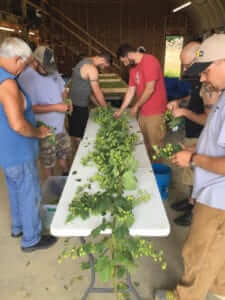A Raleigh County coal miner takes up growing hops as his backup plan and finds himself becoming a farmer.
One day a few years ago, the coal mine where Jonathan Ward works suffered a round of layoffs. He survived the cut and went home that day still employed, but wary. He and a friend talked about how coal mining continues to suffer—but at the same time, new craft breweries open left and right. Hops, they thought, would make a great backup plan.
Lost Ridge Farms started out as a single row of 50 hop plants in Ward’s yard in Raleigh County in 2016. He lost no time marketing his crop and had a customer lined up in time for his harvest in August: the just-getting-started Red Hill Brewing Company in Concord, North Carolina. The brewery became a regular customer. “We love using Cascade hops in our Amber Ale from @lostridgefarms out of West Virginia,” Red Hill later posted on Facebook. “This is a growing hop farm on our side of the world, and we’ve been proud to partner with them as we both pursue our passion for beer.”
Right time, right place: It wasn’t long before Weathered Ground Brewery was getting started up just down the road in Raleigh County, and the brewers created a Lost Ridge Pale Ale made exclusively with Lost Ridge hops.
Soon Lost Ridge was growing three popular hop varieties—Cascade, Centennial, and Zeus—on what has expanded to 275 plants in five long rows, about a quarter acre in total so far.

But he and his wife, Tiffany, quickly realized that hops alone won’t make a full-time job—once the hops are harvested in early August, they’re done for the year. To stay occupied year-round, they’ve diversified the Lost Ridge Farms operation far more than seems possible in the short few years it’s been running. They’re growing mushrooms and hoping to sell to restaurants. They’ve experimented with tapping maple trees and making syrup. They’ve growing enough variety and volume of vegetables to start a Community Supported Agriculture operation, and the CSA’s members have the option of adding fresh eggs from Lost Ridge’s hens onto their contracts. The diversity spreads out the workload. “My goal is to stay busy year-round,” Ward says. “To always have a product to sell, year-round.”
He figures it might be 10 years before he can farm full-time, and meanwhile he’s experimenting and learning. His hop yield averages 2.5 pounds per plant, but he’d like to get it up to 10. So this season he planted some Crystal hop plants as a test, and they’re growing so well he thinks he may pull out his Centennial plants, which never produced well, and replace them with Crystal.
For anyone who’s thinking of growing hops for income, Ward cautions that, like any startup operation, there’s an investment period—it won’t make money at first. But if you can stick out the early investment of time and money, the market is there and it’s only growing. He offers harvesting, pelletizing, and packaging services within a reasonable distance of Raleigh County, and he adds this encouragement: “There is huge potential now. I’m willing to help people grow. I want people to do this because it’s such a unique market to be in—it’s fun and you meet great people.”











Leave a Reply